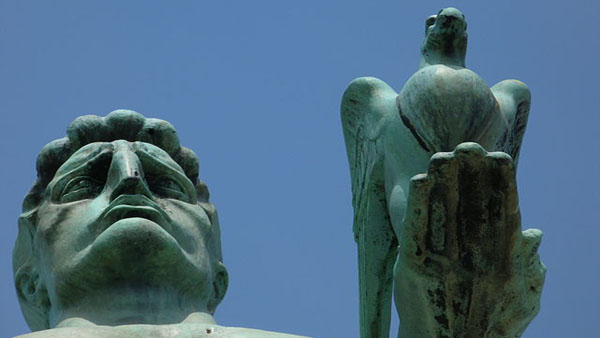What was that game played by the prime minister and citizens in front of the Parliament, after the new government was sworn in before the members of Parliament? Who directed that show and what roles were played by its leading and minor protagonists? Did this unexpected act of the prime minister show us that he doesn’t swear oath nor is he accountable to any institution, but only to the people? Is the prime minister telling us that he doesn’t believe in institutions and that he’s taking matters firmly into his own hands, which he is allegedly authorized to do by “the people” gathered in front of the Parliament? Will we be left with only a veneer of institutions comprised of obedient bodies of members of the government lined up on the Parliament stairs? If this is true, and I don’t see how it could be otherwise, then yesterday we witnessed a revolutionary (actually counter-revolutionary) reversal in the post-October history of Serbia.
Let’s start from the beginning. Who played the role of “the people” yesterday? Was the gathering in front of the Parliament publicly announced, so any citizen of Serbia could come to hear the prime minister’s promise that everything will be all right after a bit of “blood and sweat”? No, of course it wasn’t. So, “the people” were played either by those citizens who have some sort of telepathic connection with the prime minister or simply by members of the prime minister’s party, which means that the whole show was directed and initiated by the party machinery. Generally, this kind of job is the reason parties exist, but it is dangerous when a president of the party speaks to its members as to the people as a whole. It is dangerously narrow understanding of the people. The only thing we can deduce from this is that the prime minister uses a very restrictive concept of the people: people – those are the members of my party. And vice versa: members of my party – that’s the people.
Then what was the role played by the prime minister in front of carefully selected audience presented to us as the people, i.e. as general public? Until now we thought that he would only be the prime minister, i.e. the head of one of three mutually controlled independent branches of power. That was supposed to be the point of taking the oath before the members of Parliament, i.e. representatives of legislative power. Besides that, members of parliament are legitimate representatives of citizens of Serbia, unlike the party group which was gathered in the parking lot. And again, it’s as if the prime minister will not settle for being “just” the prime minister, but he immediately promoted himself to a “leader”, and a leader is responsible only and directly to the people. So, that staging of “the people” was meant by the highest officials (the highest power would be more appropriate here, since the official power – in any of its three forms – still has some limits) to show us that Serbia has gained not just the prime minister, but also “a leader”.
Finally, we should also consider importance of the scenery of the enthronement. The whole thing happened at the doorstep of the Parliament. That doorstep symbolically represents the line that separates political society from the pre-political community. The order of events is also important. After a three-hour torment, the prime minister first swore an oath within the institutions, and then immediately broke it by stepping over the institutional doorstep into the area of pre-political. If we were to understand the division between political and pre-political as a division between civilization and barbarism, and there are ample reasons for this, we are one step away from the conclusion that yesterday Serbia was taken back to the state of barbarism by its prime minister who transformed from the prime minister into a leader of the people in a revolutionary directed sequence of history. A similar revolutionary show happened on the same stairs a few decades ago, when another leader spoke directly to “the people” and promised imminent arrests. We already knew that the history repeats itself – first as tragedy, then as farce. Unfortunately, there are no guarantees that this will remain just a farce.
Translated by Marijana Simic
Peščanik.net, 01.05.2014.
- Biografija
- Latest Posts
Latest posts by Dejan Ilić (see all)
- Dođeš mi, dođem ti - 26/04/2024
- Greška bi nas spasila - 23/04/2024
- Everyone keeps talking about Banjska - 20/04/2024



